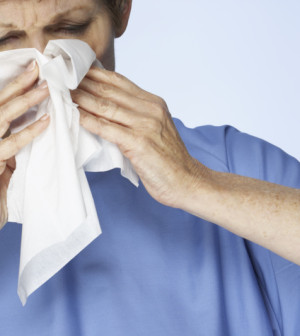- 8 Ways to Increase Dopamine Naturally
- 7 Best Breads for Maintaining Stable Blood Sugar
- Gelatin vs. Collagen: Which is Best for Skin, Nails, and Joints?
- The Long-Term Effects of Daily Turmeric Supplements on Liver Health
- Could Your Grocery Store Meat Be Causing Recurring UTIs?
- Are You Making This Expensive Thermostat Error This Winter?
- Recognizing the Signs of Hypothyroidism
- 10 Strategies to Overcome Insomnia
- Could Artificial Sweeteners Be Aging the Brain Faster?
- Techniques for Soothing Your Nervous System
Ultramarathoners: How’s Their Health?


As ultramarathons become more popular, researchers have launched a long-term study of the runners who participate in these extremely long races.
Keeping tabs on the runners’ health and psychological makeup could help reduce their risk of injury and reveal ways to encourage other Americans to meet minimum levels of exercise, the researchers said.
An ultramarathon is defined as an event that’s longer than the standard 26.2-mile marathon. Participation in ultramarathons in North America rose from 15,500 in 1998 to more than 63,500 in 2012, according to UltraRunning magazine.
Yet little is known about the health effects of this intense form of physical activity, the study authors said.
To learn more, they analyzed online questionnaires completed by more than 1,200 ultrarunners, who were asked about their training regimens, general health and running-related injuries during the previous 12 months. The investigators plan to follow this group of runners for 20 years.
It came as no surprise that ultrarunners are healthier than the average American, the researchers said. During the previous year, ultrarunners missed an average of two days of work or school due to illness or injury, compared with four days for people in the general population, according to the study, which was published Jan. 8 in the journal PLoS One.
Most of the ultrarunners’ health care visits (64 percent) were for exercise-related injuries. More than three-quarters of ultrarunners had an exercise-related injury in the previous year, and 65 percent lost at least one training day to injury. Like all runners, most of the injuries suffered by ultrarunners involved the knees and other parts of the legs and feet, the study found.
Injuries were more common among younger, less experienced runners.
“It’s a bit like drivers: Young drivers are at higher risk of car crashes than older people,” study author Dr. Eswar Krishnan, a clinical epidemiologist and assistant professor of medicine at the Stanford University School of Medicine, said in a university news release. “Similarly, people who have recently started running are much more likely to suffer injuries than veteran ultramarathoners.”
With the next questionnaire, which will be sent early this year, the researchers hope to find out if certain types of knowledge or adaptations help protect more experienced runners from injuries.
The researchers said they were surprised to find that 11 percent of ultrarunners had asthma and 25 percent had allergies, while only 7 percent to 8 percent of the general population has each of these conditions.
The higher rate of allergies among ultrarunners might be because they spend more time outdoors and have more contact with pollen and other allergens, the researchers said. Their higher rate of asthma might be related to allergies.
The researchers also found that 5 percent of ultrarunners were hospitalized after a competitive event in the past year. More than half of these hospitalizations were due to dehydration, electrolyte disturbance or heat exhaustion, the researchers said, and about 20 percent were for fractures or dislocations.
Studying the health of ultrarunners could provide useful information for the general population, Krishnan said.
“It will help us to understand how much exercise is optimal, how much recreational activity is appropriate and beneficial, and if there is a reason not to push your body beyond a certain point,” he said.
The researchers also want to learn more about the psychology of ultrarunners. Understanding what motivates them could prove useful in encouraging others to meet minimum levels of exercise.
More information
The American Academy of Orthopaedic Surgeons offers tips for a safe running program.
Source: HealthDay
Copyright © 2026 HealthDay. All rights reserved.










